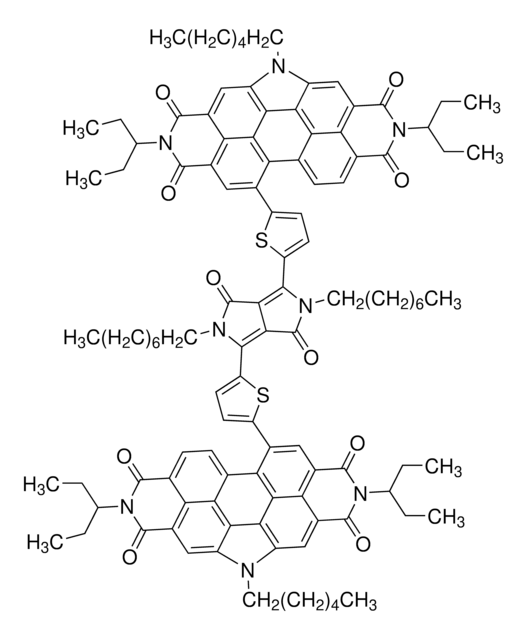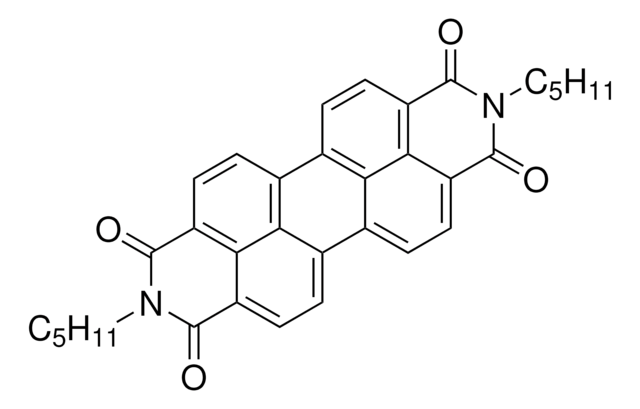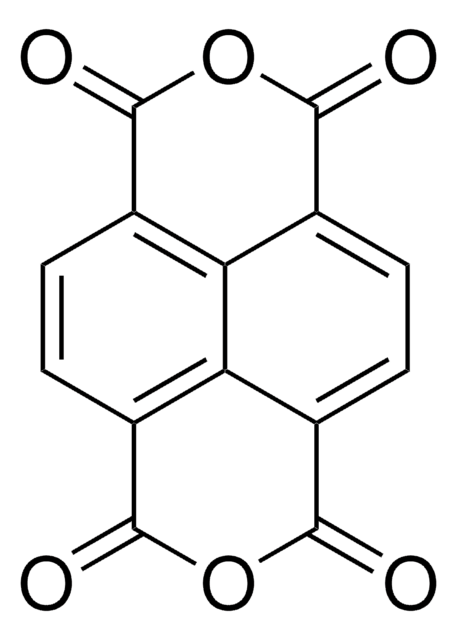932353
PTCDI
Synonym(s):
3,4,9,10-Perylenetetracarboxylic acid diimide
Sign Into View Organizational & Contract Pricing
All Photos(2)
About This Item
Empirical Formula (Hill Notation):
C24H10N2O4
CAS Number:
Molecular Weight:
390.35
MDL number:
UNSPSC Code:
12352302
NACRES:
NA.23
Recommended Products
Related Categories
Application
This TADF emitter is a sublimed high purity material, solution processable 3,4,9,10-perylenetetracarboxylic diimide has been reported for use in:
- photovoltaics
- thermoelectricity (induced by the Soret effect )
- batteries for energy storage
- photocatalysis for water purification or selective solar fuel production from CO2
- chemosensing
Signal Word
Warning
Hazard Statements
Precautionary Statements
Hazard Classifications
STOT RE 2
Storage Class Code
11 - Combustible Solids
WGK
WGK 3
Flash Point(F)
Not applicable
Flash Point(C)
Not applicable
Choose from one of the most recent versions:
Certificates of Analysis (COA)
Lot/Batch Number
Don't see the Right Version?
If you require a particular version, you can look up a specific certificate by the Lot or Batch number.
Already Own This Product?
Find documentation for the products that you have recently purchased in the Document Library.
Ping Chen et al.
Environmental science & technology, 53(3), 1564-1575 (2019-01-04)
This study describes a promising sunlight-driven photocatalyst for the treatment of ofloxacin and other fluoroquinolone antibiotics in water and wastewater. Perylene diimide (PDI) supramolecular nanofibers, which absorb a broad spectrum of sunlight, were prepared via a facile acidification polymerization protocol.
Fully Solution-Processed Small Molecule Semitransparent Solar Cells: Optimization of Transparent Cathode Architecture and Four Absorbing Layers
J.Min et al.
Advanced Functional Materials
, 26, 4543-4550 (2016)
Qinglin Jiang et al.
Advanced materials (Deerfield Beach, Fla.), 32(45), e2002752-e2002752 (2020-09-15)
Low-cost, non-toxic, abundant organic thermoelectric materials are currently under investigation for use as potential alternatives for the production of electricity from waste heat. While organic conductors reach electrical conductivities as high as their inorganic counterparts, they suffer from an overall
Mengmeng Sun et al.
Chemical Society reviews, 45(6), 1513-1528 (2016-01-23)
Water-soluble perylenediimides (PDIs) with high fluorescence intensity, photostability and biocompatibility have been successfully prepared and applied in the biological field. In this tutorial review, we briefly focus on the synthetic strategies for the preparation of water-soluble PDIs by incorporating ionic
Shu Wang et al.
ACS nano, 14(5), 5998-6006 (2020-05-10)
The visual aesthetic that involves color, brightness, and glossiness is of great importance for building integrated photovoltaics. Semitransparent organic solar cells (ST-OSCs) are thus considered as the most promising candidate due to their superiority in transparency and efficiency. However, the
Our team of scientists has experience in all areas of research including Life Science, Material Science, Chemical Synthesis, Chromatography, Analytical and many others.
Contact Technical Service








![N,N′-Bis[2-(2-tert-butyldimethylsilyloxyethoxy)ethyl]-3,4,9,10-perylenetetracarboxylic diimide 97%](/deepweb/assets/sigmaaldrich/product/structures/334/047/4ac691aa-ae25-4df1-9e0d-09ed12cb8f1f/640/4ac691aa-ae25-4df1-9e0d-09ed12cb8f1f.png)
